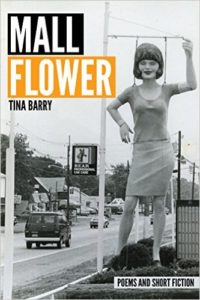In Mall Flower, poet and writer Tina Barry mixes poems and short fiction to record a life—childhood, youth, and adulthood. This artful combination of two literary forms also suggests a question: is there a difference between the two?
These 35 poems and (very) short stories—almost all are less than a page—follow in roughly chronological order. From the beginning we know that this is the story of a child in a broken family abandoned by the father. The impact is large; a five-year-old girl is left devastated and looking for answers. By the time she’s 10, she knows that the brokenness has become the normal, but that doesn’t mean she can’t yearn for what was.
What we’ll be

six firemen
three teachers
four housewives
the first female President
two policemen
an engineer (the kind that drove a train)
twin veterinarians who liked birds
but would specialize in horses
one fashion model
I was the only hippie
I described a wedding I witnessed in a park
The bride wore a black dress:
hundreds of pleats, an embroidered
field of poppies
The groom donned denim
After the vows, the guests
tossed brown rice
I imagined the hippies’ lives
a million sunflowers
and three pink babies.
Their family nothing like mine:
One housewife
One daughter
One salesman long gone.
Each poem and story resonates with a kind of angry defiance (like being the only child in the class who wants to grow up to be a hippie). The defensiveness gives way to the finding and acceptance of self. It’s a journey that includes the sacred and profane and much in between.

Tina Barry
Tina Barry’s poems have been published in such publications as Drunken Boat, Boston Literary Magazine, MadHat Lit, Lost in Thought, Inch Magazine, and The Orange Room Review, among others. She received her MFA degree from the creative writing program at Long Island University, Brooklyn.
How Barry mixes poetry and fiction is intriguing. It’s not so much that this story can’t be told without using both as it is that story is told through both. The fictional entries, like flash fiction, are short, but they could just as easily be described as prose poems. She’s comfortable using both, and likely sees both as a means to tell her story.
The family brokenness of Mall Flower is, unfortunately, all too common a story. What Tina Barry does, however, is to make the telling of it an uncommon one. It is moving and heartrending to watch this girl, this young woman, and this adult deal with a reality not of her making but which makes and remakes her.
Photo by Alessandro Valli, Creative Commons, via Flickr. Post by Glynn Young, author of the novels Dancing Priest and A Light Shining, and Poetry at Work.
Related:
Blossoming Mall Flower: Huffington Post interview with Tina Barry
__________________________

“I require all our incoming poetry students—in the MFA I direct—to buy and read this book.”
—Jeanetta Calhoun Mish
- Poets and Fables: Steven Flint and “The Sun and the Boy” - July 3, 2025
- Poets and Poems: Alison Blevins and “Where Will We Live if the House Burns Down?” - July 1, 2025
- Poets and Poems: Paul Pastor and “The Locust Years” - June 26, 2025

Bethany says
Thank you for this post, I like Tina Barry’s poem, “What we’ll be.” Such innocence and reality in the kinds of jobs kids pick to dream about. And the details of the bride’s dress stick with me as I read the punch of that last line.
Glynn says
Bethany, what I like about this is the idea of childhood dreams – the things we believe with all our hearts we’re going to be, until next week, at least. Two of my own favorite dreams were to be a cowboy and then the driver of a garbage truck.
Bethany says
Yes, “until next week, at least.” 😉 Love those vocation wishes of yours, Glynn. My son used to eagerly look forward to Friday mornings when the rumble would make its way down our street, to lift and flip cans bigger than him.
I remember checking boxes on a “What do you want to be when you grow up?” type of worksheet back when I was in grade school. I believe my top picks were: Artist, Secretary (for access to all the office supplies), and Archaelogist.
D. drury says
The literary style of your text nods to the multigenre style of Tom Romano. Well done.
Bethany R. says
D. Drury, welcome to the Tweetspeak Poetry community. 🙂 I clicked on your link, and enjoyed reading some of your writing. If you haven’t been already, Our Mischief Cafe page is a great place to find out what else is brewing on the site here: https://www.tweetspeakpoetry.com/mischief-cafe/
Glynn says
Thanks for the comment, and let me add my welcome to Bethany’s!
Tina Barry says
Hi Glynn,
I just want to give you a big, heartfelt thank you for your sensitive review of Mall Flower. Your comments about my style and intentions are spot on. I love your last line, too. Aren’t we all products of the experiences that “make and remake” us?
Best,
Tina